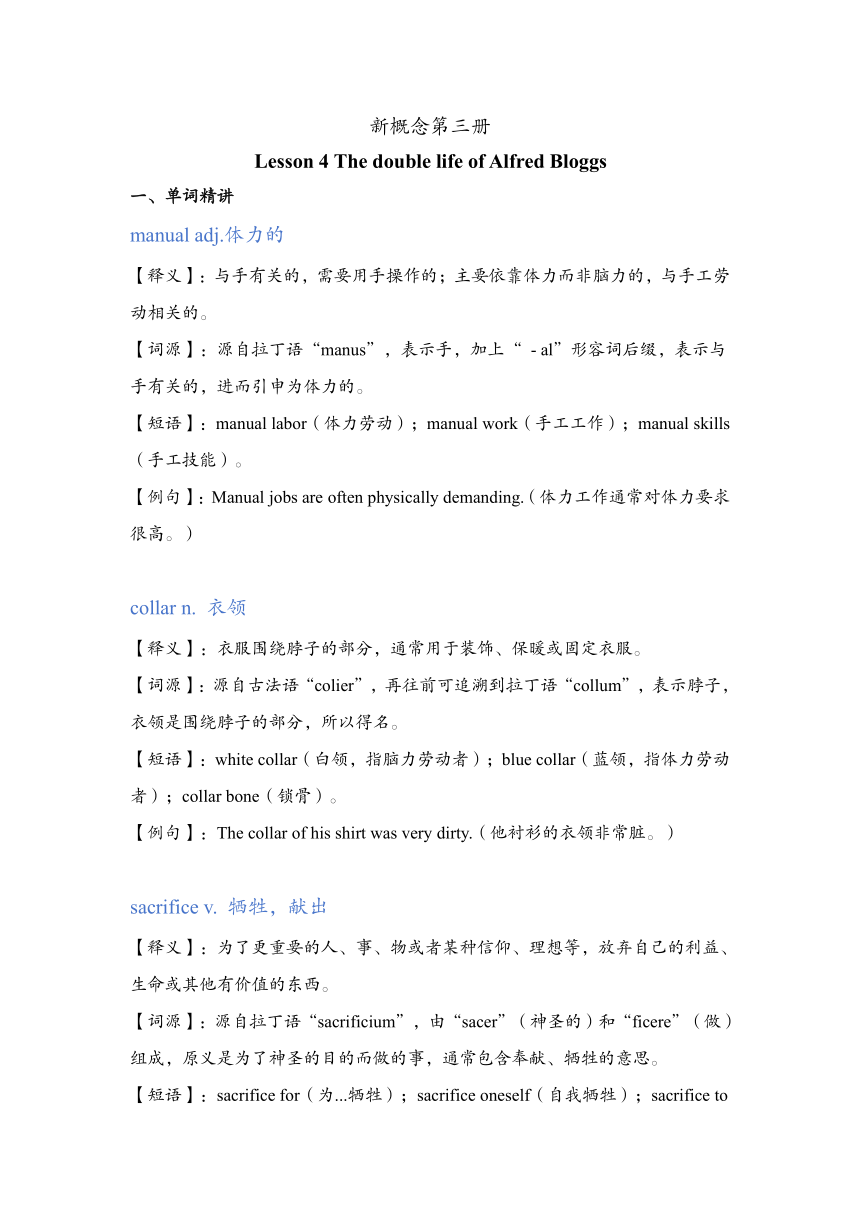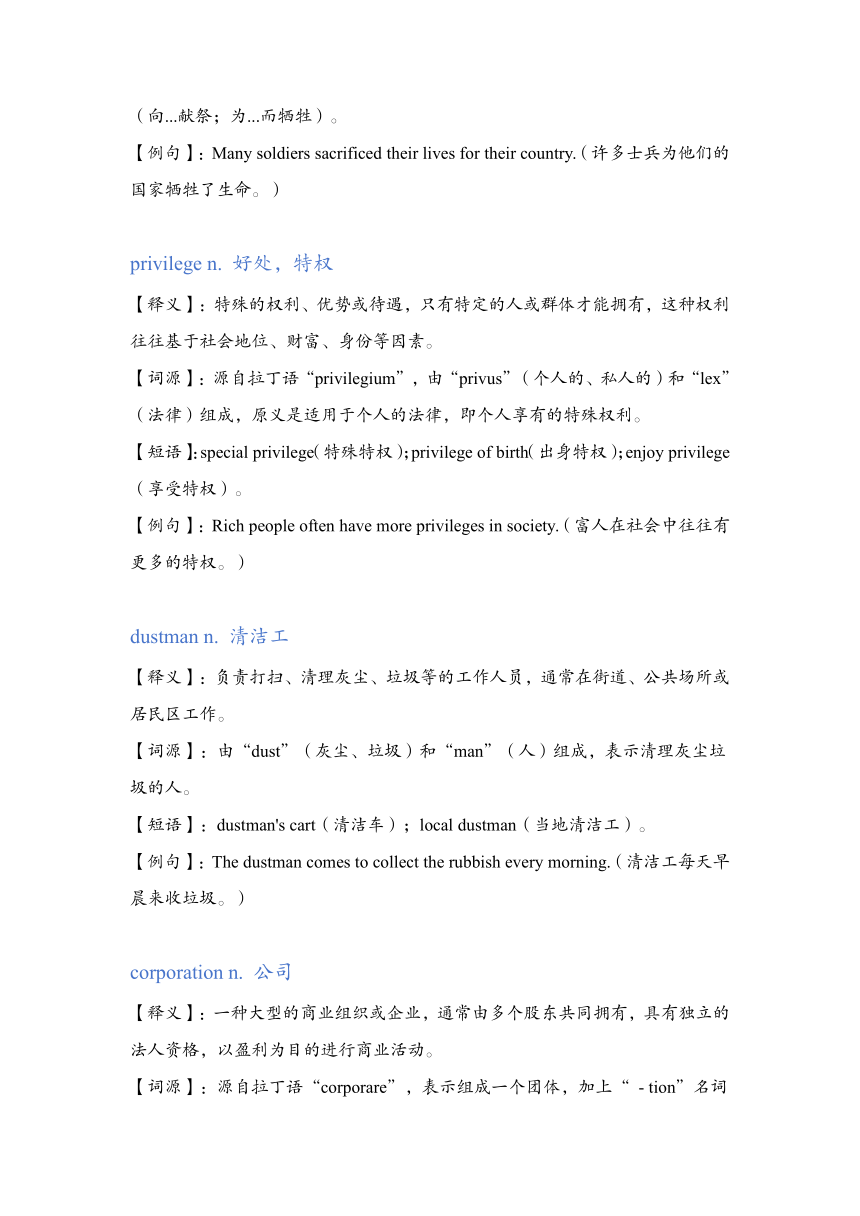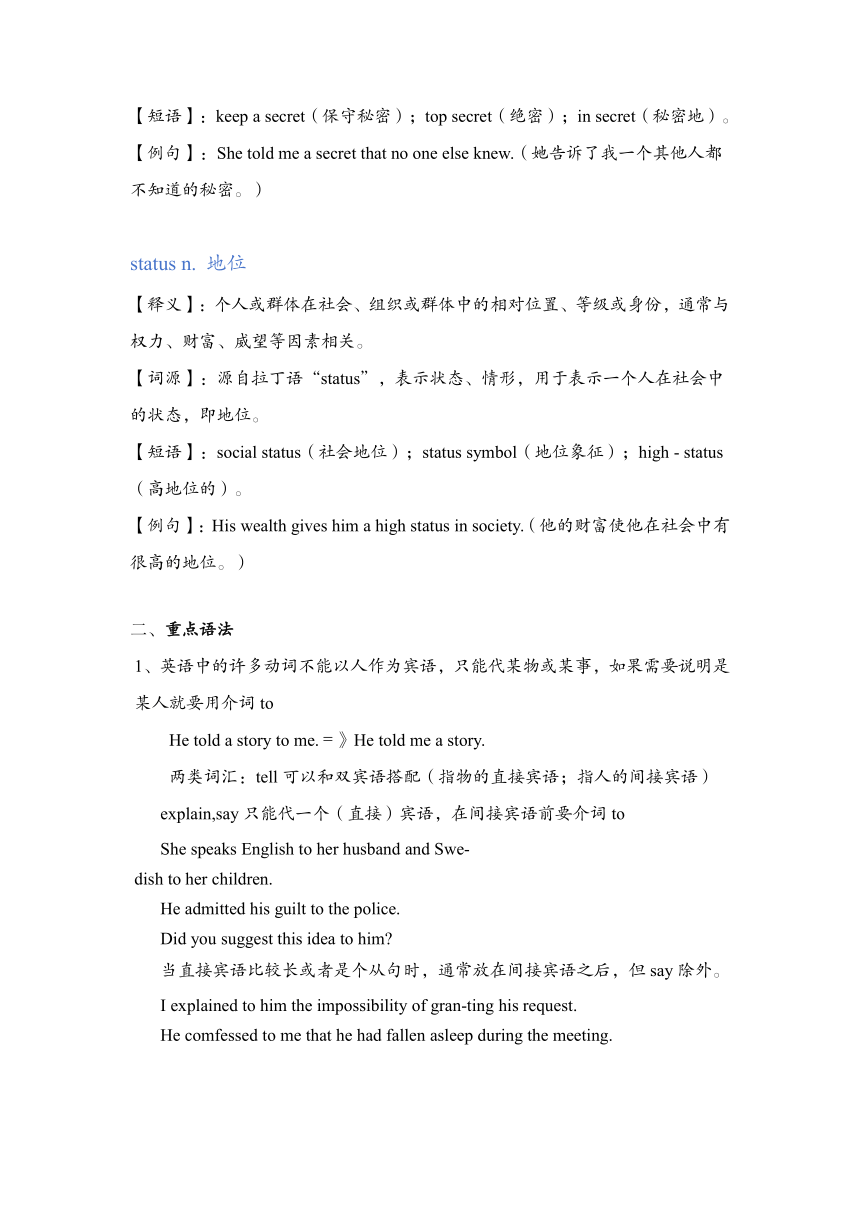新概念第三册Lesson 4 The double life of Alfred Bloggs讲义
文档属性
| 名称 | 新概念第三册Lesson 4 The double life of Alfred Bloggs讲义 |  | |
| 格式 | docx | ||
| 文件大小 | 127.3KB | ||
| 资源类型 | 教案 | ||
| 版本资源 | 新概念英语 | ||
| 科目 | 英语 | ||
| 更新时间 | 2024-12-04 14:05:09 | ||
图片预览




文档简介
新概念第三册
Lesson 4 The double life of Alfred Bloggs
单词精讲
manual adj.体力的
【释义】:与手有关的,需要用手操作的;主要依靠体力而非脑力的,与手工劳动相关的。
【词源】:源自拉丁语“manus”,表示手,加上“ - al”形容词后缀,表示与手有关的,进而引申为体力的。
【短语】:manual labor(体力劳动);manual work(手工工作);manual skills(手工技能)。
【例句】:Manual jobs are often physically demanding.(体力工作通常对体力要求很高。)
collar n. 衣领
【释义】:衣服围绕脖子的部分,通常用于装饰、保暖或固定衣服。
【词源】:源自古法语“colier”,再往前可追溯到拉丁语“collum”,表示脖子,衣领是围绕脖子的部分,所以得名。
【短语】:white collar(白领,指脑力劳动者);blue collar(蓝领,指体力劳动者);collar bone(锁骨)。
【例句】:The collar of his shirt was very dirty.(他衬衫的衣领非常脏。)
sacrifice v. 牺牲,献出
【释义】:为了更重要的人、事、物或者某种信仰、理想等,放弃自己的利益、生命或其他有价值的东西。
【词源】:源自拉丁语“sacrificium”,由“sacer”(神圣的)和“ficere”(做)组成,原义是为了神圣的目的而做的事,通常包含奉献、牺牲的意思。
【短语】:sacrifice for(为...牺牲);sacrifice oneself(自我牺牲);sacrifice to(向...献祭;为...而牺牲)。
【例句】:Many soldiers sacrificed their lives for their country.(许多士兵为他们的国家牺牲了生命。)
privilege n. 好处,特权
【释义】:特殊的权利、优势或待遇,只有特定的人或群体才能拥有,这种权利往往基于社会地位、财富、身份等因素。
【词源】:源自拉丁语“privilegium”,由“privus”(个人的、私人的)和“lex”(法律)组成,原义是适用于个人的法律,即个人享有的特殊权利。
【短语】:special privilege(特殊特权);privilege of birth(出身特权);enjoy privilege(享受特权)。
【例句】:Rich people often have more privileges in society.(富人在社会中往往有更多的特权。)
dustman n. 清洁工
【释义】:负责打扫、清理灰尘、垃圾等的工作人员,通常在街道、公共场所或居民区工作。
【词源】:由“dust”(灰尘、垃圾)和“man”(人)组成,表示清理灰尘垃圾的人。
【短语】:dustman's cart(清洁车);local dustman(当地清洁工)。
【例句】:The dustman comes to collect the rubbish every morning.(清洁工每天早晨来收垃圾。)
corporation n. 公司
【释义】:一种大型的商业组织或企业,通常由多个股东共同拥有,具有独立的法人资格,以盈利为目的进行商业活动。
【词源】:源自拉丁语“corporare”,表示组成一个团体,加上“ - tion”名词后缀,表示组成的商业团体,即公司。
【短语】:multinational corporation(跨国公司);corporation tax(公司税);limited liability corporation(有限责任公司)。
【例句】:This corporation has made a lot of profit this year.(这家公司今年盈利颇丰。)
overalls n. 工作服
【释义】:一种宽松的、通常为连体的衣服,主要是为了在工作时保护身体、方便活动而穿着的,多见于工人、技工等职业。
【词源】:由“overall”(全部的、全面的)加复数后缀“ - s”构成,因为工作服是覆盖全身的,所以得名。
【短语】:work overalls(工作工作服);blue overalls(蓝色工作服)。
【例句】:The mechanic put on his overalls before starting to work.(机械师在开始工作前穿上了他的工作服。)
shower n. 淋浴
【释义】:一种洗浴方式,通过喷头将水喷洒在身上来清洁身体。
【词源】:源自古英语“scur”,表示一阵雨,淋浴就像一阵水雨洒在身上,所以得名。
【短语】:take a shower(洗淋浴);shower head(淋浴喷头);shower room(淋浴房)。
【例句】:I take a shower every morning.(我每天早晨洗淋浴。)
secret n. 秘密
【释义】:不为人知的事情、信息或情况,被有意隐藏起来不让他人知道。
【词源】:源自拉丁语“secretus”,表示分开的、隐蔽的,被隐藏起来的东西就是秘密。
【短语】:keep a secret(保守秘密);top secret(绝密);in secret(秘密地)。
【例句】:She told me a secret that no one else knew.(她告诉了我一个其他人都不知道的秘密。)
status n. 地位
【释义】:个人或群体在社会、组织或群体中的相对位置、等级或身份,通常与权力、财富、威望等因素相关。
【词源】:源自拉丁语“status”,表示状态、情形,用于表示一个人在社会中的状态,即地位。
【短语】:social status(社会地位);status symbol(地位象征);high - status(高地位的)。
【例句】:His wealth gives him a high status in society.(他的财富使他在社会中有很高的地位。)
重点语法
1、英语中的许多动词不能以人作为宾语,只能代某物或某事,如果需要说明是某人就要用介词to
He told a story to me.=》He told me a story.
两类词汇:tell可以和双宾语搭配(指物的直接宾语;指人的间接宾语)
explain,say只能代一个(直接)宾语,在间接宾语前要介词to
She speaks English to her husband and Swe-
dish to her children.
He admitted his guilt to the police.
Did you suggest this idea to him
当直接宾语比较长或者是个从句时,通常放在间接宾语之后,但say除外。
I explained to him the impossibility of gran-ting his request.
He comfessed to me that he had fallen asleep during the meeting.
2、B.“Worth"后面只能跟名词或动名词
His suggestion is worth considering.
三、课文精讲
1. These days, people who do manual work often receive far more money than people who work in offices.如今,从事体力劳动的人的收入一般要比坐办公室的人高出许多。
people who do manual work=>blue-collar workers
far more money 中far-副词用来加强语气=much
2.People who work in offices are frequently referred to as‘white-collar workers’, 那些坐在办公室的人,往往被称为“白领工人”。
people who work in offices/do mental work=>white-collar workers
white-collar workers往往指脑力劳动者,而体力劳动者则被称为 blue-collar workers, 蓝领工人。
refer to...as = regard...as 把...看作为
I always refer to him as boolworm(书呆子)
3. for the simple reason that they usually wear a collar and tie to go to work. 就是因为他们通常是穿着硬领白衬衫,系着领带去上班。
for the simple reason=>for 引导的原因状语从句
for the reason that比because正式,因此多用于正式文体
这里 that引导的从句是 the reason的同位语。
4. Such is human nature, that a great many people are often willing to sacrifice higher pay for the privilege of becoming white-collar workers.许多人常常情愿放弃较高的薪水以换取做白领工人的殊荣,此乃人之常情。
human nature人性
such...that...
such位于句首,起强调作用,后面要用倒装语序, that引导的是 such的同位语从句。
that引导同位语从句,进一步补充说明such的基本内涵
His kindness was such that we will never forget him.=Such was his kindness...
Such is human nature that we want to get a lot of things free.
be willing to do sth.=be ready to do sth.心甘情愿做
5.This can give rise to curious situations, as it did in the case of Alfred Bloggs who worked as a dustman for the Ellesmere Corporation.而这常常会引起种种奇怪的现象,在埃尔斯米尔公司当清洁工的艾尔弗雷德.布洛斯就是一个例子。
give rise to,lead to,cause:引起,惹起=result in
Such conduct might give rise to misunderstandings.
The bad conditions have given rise to a lot of crimes.
6.as it did in the case of Alfred Bloggs who… worked as a dustman for the Ellesmere Corporation. 正如给埃尔斯米尔公司当清洁工的艾尔弗雷德·布洛格斯的情况所造成的怪现象那样。
(1)as it did中的 it是指上一句中that 从句所指的情况,而 did是替代give rise to curious situations。
(2)in the case of: 至于,就...而言=concerning
Stealing isno shame in the case of him.
in case of:(连)万一,以访
You should ensure your house in case of fire.
(3)who引导定语从句
7.When he got married, Alf was too embarrassed to say anything to his wife about his job.艾尔弗结婚时,感到非常难为情,而没有将自己的职业告诉妻子。
(1)too embarrassed to say:太尴尬而没有说明
be ashamed of
(2)get married
marry(v.)如果强调动作:He married the girl
如果表示状态:get married,be married
如果表明和某人已经结婚多长时间了:be married to sb
The old man has been married to his wife for 50 years.
(3)too...to...:太...而不能
8.He simply told her that he worked for the Corporation.他只说在埃尔斯米尔公司上班。
simply:副词,用来修饰限定动词told
9.Every morning, he left home dressed in a smart black suit.每天早晨,他穿上一身漂亮的黑色西装离家上班,
dressed in a smart balck suit---形容词短语表示一种状态
He got to work dressed in a beautiful coat.
He left home wearing a smart balck suit.
10.He then changed into overalls and spent the next eight hours as a dustman.然后换上工作服,当8个小时清洁工。
changed into:换上
11.Before returning home at night, He took a shower and changed back into his suit.晚上回家前,他洗个淋浴,重新换上那身黑色西服。
Before returning home=Before he returned home
在Before引导的时间状语从句中,return的逻辑主语和主句的主语he是保持一致的,所以这个时间状语是有介词Before和动名词搭配而成,相当于Before引导的时间状语从句。
如果运用动名词形式,动名词的逻辑主语必须是主句的主语
After gettting home,he had a good rest.
Before having dinner,he finished all his homework.
12.Alf's wife has never discovered that she married a dustman and she never will,艾尔弗的妻子一直不知道她嫁给了一个清洁工,而且她永远也不会知道了,
she never will=she will never discover the secret
在省略句式中,never要放在助动词之前
“will you go to see her "
“I will never to to see her"/"no ,I never will."
13.He will be earning only half as much as he used to, but he feels that his rise in status is well worth the loss of money.他将来挣的钱只有他现在的一半。不过他觉得,地位升高了,损失点儿钱也值得。
(1) half as much as he used to, 只相当于过去的一半。
half as much as (he used to)
half(a quarter,twice,three times)as .... as...---表示倍数
I won't marry a man who is twice as old as me.
We got three times as many people as we exp-
ected.
This room is about three times as large as that one.
(2)...as(形容词或副词原形)as...:是...几倍
比...多几倍:...times(形容词或副词比较级)
This road is four times longer than that one.
=》This road is five times as long as that one.
(3) is well worth the loss of money
What he obtained is well worth the loss of time.
well 副词用来加强语气,修饰形容词worth
Lesson 4 The double life of Alfred Bloggs
单词精讲
manual adj.体力的
【释义】:与手有关的,需要用手操作的;主要依靠体力而非脑力的,与手工劳动相关的。
【词源】:源自拉丁语“manus”,表示手,加上“ - al”形容词后缀,表示与手有关的,进而引申为体力的。
【短语】:manual labor(体力劳动);manual work(手工工作);manual skills(手工技能)。
【例句】:Manual jobs are often physically demanding.(体力工作通常对体力要求很高。)
collar n. 衣领
【释义】:衣服围绕脖子的部分,通常用于装饰、保暖或固定衣服。
【词源】:源自古法语“colier”,再往前可追溯到拉丁语“collum”,表示脖子,衣领是围绕脖子的部分,所以得名。
【短语】:white collar(白领,指脑力劳动者);blue collar(蓝领,指体力劳动者);collar bone(锁骨)。
【例句】:The collar of his shirt was very dirty.(他衬衫的衣领非常脏。)
sacrifice v. 牺牲,献出
【释义】:为了更重要的人、事、物或者某种信仰、理想等,放弃自己的利益、生命或其他有价值的东西。
【词源】:源自拉丁语“sacrificium”,由“sacer”(神圣的)和“ficere”(做)组成,原义是为了神圣的目的而做的事,通常包含奉献、牺牲的意思。
【短语】:sacrifice for(为...牺牲);sacrifice oneself(自我牺牲);sacrifice to(向...献祭;为...而牺牲)。
【例句】:Many soldiers sacrificed their lives for their country.(许多士兵为他们的国家牺牲了生命。)
privilege n. 好处,特权
【释义】:特殊的权利、优势或待遇,只有特定的人或群体才能拥有,这种权利往往基于社会地位、财富、身份等因素。
【词源】:源自拉丁语“privilegium”,由“privus”(个人的、私人的)和“lex”(法律)组成,原义是适用于个人的法律,即个人享有的特殊权利。
【短语】:special privilege(特殊特权);privilege of birth(出身特权);enjoy privilege(享受特权)。
【例句】:Rich people often have more privileges in society.(富人在社会中往往有更多的特权。)
dustman n. 清洁工
【释义】:负责打扫、清理灰尘、垃圾等的工作人员,通常在街道、公共场所或居民区工作。
【词源】:由“dust”(灰尘、垃圾)和“man”(人)组成,表示清理灰尘垃圾的人。
【短语】:dustman's cart(清洁车);local dustman(当地清洁工)。
【例句】:The dustman comes to collect the rubbish every morning.(清洁工每天早晨来收垃圾。)
corporation n. 公司
【释义】:一种大型的商业组织或企业,通常由多个股东共同拥有,具有独立的法人资格,以盈利为目的进行商业活动。
【词源】:源自拉丁语“corporare”,表示组成一个团体,加上“ - tion”名词后缀,表示组成的商业团体,即公司。
【短语】:multinational corporation(跨国公司);corporation tax(公司税);limited liability corporation(有限责任公司)。
【例句】:This corporation has made a lot of profit this year.(这家公司今年盈利颇丰。)
overalls n. 工作服
【释义】:一种宽松的、通常为连体的衣服,主要是为了在工作时保护身体、方便活动而穿着的,多见于工人、技工等职业。
【词源】:由“overall”(全部的、全面的)加复数后缀“ - s”构成,因为工作服是覆盖全身的,所以得名。
【短语】:work overalls(工作工作服);blue overalls(蓝色工作服)。
【例句】:The mechanic put on his overalls before starting to work.(机械师在开始工作前穿上了他的工作服。)
shower n. 淋浴
【释义】:一种洗浴方式,通过喷头将水喷洒在身上来清洁身体。
【词源】:源自古英语“scur”,表示一阵雨,淋浴就像一阵水雨洒在身上,所以得名。
【短语】:take a shower(洗淋浴);shower head(淋浴喷头);shower room(淋浴房)。
【例句】:I take a shower every morning.(我每天早晨洗淋浴。)
secret n. 秘密
【释义】:不为人知的事情、信息或情况,被有意隐藏起来不让他人知道。
【词源】:源自拉丁语“secretus”,表示分开的、隐蔽的,被隐藏起来的东西就是秘密。
【短语】:keep a secret(保守秘密);top secret(绝密);in secret(秘密地)。
【例句】:She told me a secret that no one else knew.(她告诉了我一个其他人都不知道的秘密。)
status n. 地位
【释义】:个人或群体在社会、组织或群体中的相对位置、等级或身份,通常与权力、财富、威望等因素相关。
【词源】:源自拉丁语“status”,表示状态、情形,用于表示一个人在社会中的状态,即地位。
【短语】:social status(社会地位);status symbol(地位象征);high - status(高地位的)。
【例句】:His wealth gives him a high status in society.(他的财富使他在社会中有很高的地位。)
重点语法
1、英语中的许多动词不能以人作为宾语,只能代某物或某事,如果需要说明是某人就要用介词to
He told a story to me.=》He told me a story.
两类词汇:tell可以和双宾语搭配(指物的直接宾语;指人的间接宾语)
explain,say只能代一个(直接)宾语,在间接宾语前要介词to
She speaks English to her husband and Swe-
dish to her children.
He admitted his guilt to the police.
Did you suggest this idea to him
当直接宾语比较长或者是个从句时,通常放在间接宾语之后,但say除外。
I explained to him the impossibility of gran-ting his request.
He comfessed to me that he had fallen asleep during the meeting.
2、B.“Worth"后面只能跟名词或动名词
His suggestion is worth considering.
三、课文精讲
1. These days, people who do manual work often receive far more money than people who work in offices.如今,从事体力劳动的人的收入一般要比坐办公室的人高出许多。
people who do manual work=>blue-collar workers
far more money 中far-副词用来加强语气=much
2.People who work in offices are frequently referred to as‘white-collar workers’, 那些坐在办公室的人,往往被称为“白领工人”。
people who work in offices/do mental work=>white-collar workers
white-collar workers往往指脑力劳动者,而体力劳动者则被称为 blue-collar workers, 蓝领工人。
refer to...as = regard...as 把...看作为
I always refer to him as boolworm(书呆子)
3. for the simple reason that they usually wear a collar and tie to go to work. 就是因为他们通常是穿着硬领白衬衫,系着领带去上班。
for the simple reason=>for 引导的原因状语从句
for the reason that比because正式,因此多用于正式文体
这里 that引导的从句是 the reason的同位语。
4. Such is human nature, that a great many people are often willing to sacrifice higher pay for the privilege of becoming white-collar workers.许多人常常情愿放弃较高的薪水以换取做白领工人的殊荣,此乃人之常情。
human nature人性
such...that...
such位于句首,起强调作用,后面要用倒装语序, that引导的是 such的同位语从句。
that引导同位语从句,进一步补充说明such的基本内涵
His kindness was such that we will never forget him.=Such was his kindness...
Such is human nature that we want to get a lot of things free.
be willing to do sth.=be ready to do sth.心甘情愿做
5.This can give rise to curious situations, as it did in the case of Alfred Bloggs who worked as a dustman for the Ellesmere Corporation.而这常常会引起种种奇怪的现象,在埃尔斯米尔公司当清洁工的艾尔弗雷德.布洛斯就是一个例子。
give rise to,lead to,cause:引起,惹起=result in
Such conduct might give rise to misunderstandings.
The bad conditions have given rise to a lot of crimes.
6.as it did in the case of Alfred Bloggs who… worked as a dustman for the Ellesmere Corporation. 正如给埃尔斯米尔公司当清洁工的艾尔弗雷德·布洛格斯的情况所造成的怪现象那样。
(1)as it did中的 it是指上一句中that 从句所指的情况,而 did是替代give rise to curious situations。
(2)in the case of: 至于,就...而言=concerning
Stealing isno shame in the case of him.
in case of:(连)万一,以访
You should ensure your house in case of fire.
(3)who引导定语从句
7.When he got married, Alf was too embarrassed to say anything to his wife about his job.艾尔弗结婚时,感到非常难为情,而没有将自己的职业告诉妻子。
(1)too embarrassed to say:太尴尬而没有说明
be ashamed of
(2)get married
marry(v.)如果强调动作:He married the girl
如果表示状态:get married,be married
如果表明和某人已经结婚多长时间了:be married to sb
The old man has been married to his wife for 50 years.
(3)too...to...:太...而不能
8.He simply told her that he worked for the Corporation.他只说在埃尔斯米尔公司上班。
simply:副词,用来修饰限定动词told
9.Every morning, he left home dressed in a smart black suit.每天早晨,他穿上一身漂亮的黑色西装离家上班,
dressed in a smart balck suit---形容词短语表示一种状态
He got to work dressed in a beautiful coat.
He left home wearing a smart balck suit.
10.He then changed into overalls and spent the next eight hours as a dustman.然后换上工作服,当8个小时清洁工。
changed into:换上
11.Before returning home at night, He took a shower and changed back into his suit.晚上回家前,他洗个淋浴,重新换上那身黑色西服。
Before returning home=Before he returned home
在Before引导的时间状语从句中,return的逻辑主语和主句的主语he是保持一致的,所以这个时间状语是有介词Before和动名词搭配而成,相当于Before引导的时间状语从句。
如果运用动名词形式,动名词的逻辑主语必须是主句的主语
After gettting home,he had a good rest.
Before having dinner,he finished all his homework.
12.Alf's wife has never discovered that she married a dustman and she never will,艾尔弗的妻子一直不知道她嫁给了一个清洁工,而且她永远也不会知道了,
she never will=she will never discover the secret
在省略句式中,never要放在助动词之前
“will you go to see her "
“I will never to to see her"/"no ,I never will."
13.He will be earning only half as much as he used to, but he feels that his rise in status is well worth the loss of money.他将来挣的钱只有他现在的一半。不过他觉得,地位升高了,损失点儿钱也值得。
(1) half as much as he used to, 只相当于过去的一半。
half as much as (he used to)
half(a quarter,twice,three times)as .... as...---表示倍数
I won't marry a man who is twice as old as me.
We got three times as many people as we exp-
ected.
This room is about three times as large as that one.
(2)...as(形容词或副词原形)as...:是...几倍
比...多几倍:...times(形容词或副词比较级)
This road is four times longer than that one.
=》This road is five times as long as that one.
(3) is well worth the loss of money
What he obtained is well worth the loss of time.
well 副词用来加强语气,修饰形容词worth
同课章节目录
